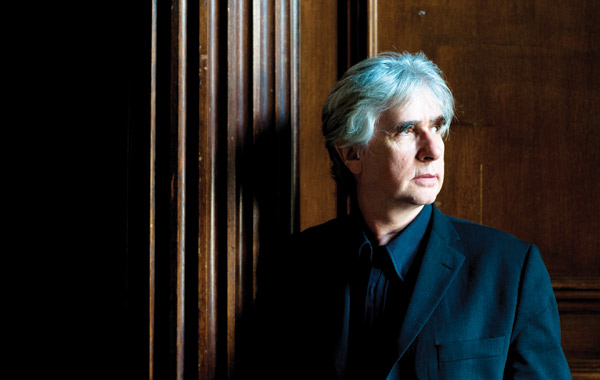By Vivienne Russell | 1 June 2012
After dominating television for more than 30 years, Phil Redmond is creating some live dramas of his own in his home city of Liverpool. He talks to PF about culture, cohesion and council bureaucracy

In Phil Redmond’s office, deep within Liverpool’s splendid World Museum, is a screen print of John Lennon, clutching a guitar and mocked up to look like the Mona Lisa. It adds a touch of irreverent cool, but also underscores Redmond’s passion for culture and his fierce Liverpudlian pride.
With his mane of grey hair and well-cut black clothes, Redmond brings a little bit of edge and rock-star glamour to the sometimes dour world of Public Finance. He made his name and fortune in television, devising and writing hugely popular, durable and influential dramas that struck a neat balance between gritty social-realism and mass market appeal.
First was Grange Hill, the long-running children’s series about life in a tough North London comprehensive: the exploits of Tucker Jenkins or Zammo Maguire colour the childhood memories of many people born after the mid-1960s. Then there was Brookside, for which Redmond returned to his native Liverpool, buying up a whole close of newly built houses to use as his set.
‘If I was going to spend £4m, why should I spend it in Surrey?’ he tells PF. Brookside – ‘Brookie’ to aficionados – ran for 21 years on Channel 4, smashing several telly taboos along the way. Hollyoaks, a somewhat glossy soap opera, beloved of teenagers and students, hit the screens in 1995 and is still broadcast every weekday.
Redmond sold his production company, Mersey Television, in 2005. Since then he has carved out a niche in public life, which he will be discussing at CIPFA’s annual conference in July.
Shortly after the 2010 general election, Redmond found himself inside Number 10 giving David Cameron’s people a frank appraisal of the prime minister’s pet Big Society policy. ‘Big Society is a crap name, a crap slogan, but the basic idea is something that I grew up with and this city has always done, through philanthropy, charity, community activity, social justice, political activity. These all add up to what the Big Society actually is. That’s it.’
It was enough for Number 10 to offer him a job championing the Big Society in Liverpool, which became one of four ‘vanguard’ areas. Despite a lack of affinity with the Tories, Redmond agreed, hoping it would help maintain the cross-sector co-operation that emerged in the wake of Liverpool’s 2008 Capital of Culture project, in which he played a major role.
And, pragmatically, he spotted a chance for his city to be a member of what he calls the ‘inner court’. ‘As a Scouser, it’s a great opportunity.’ But only a few months later the project collapsed in a heap of blame and bad faith. Labour council leader Joe Anderson (who was elected city mayor in May) pulled the council out, citing spending cuts and the government’s failure to keep its side of the bargain.
Redmond likens the experience to one of his own TV dramas. ‘It was a very simple tale that turned into a very complex saga,’ he says, a touch ruefully.
More than a year on, he still laments the vanguard’s failure as a missed opportunity and admits to ‘great rows’ with Anderson over his decision. Acknowledging that Anderson, as council leader, had the constitutional and democratic right to remove Liverpool from the scheme, Redmond offers the reminder that the council is only a small part of any city.
‘I’ve heard councillors say, “It’s my city”. What are you talking about? It’s not your city at all! Everyone gets on, despite you.’
Criticism of the council as remote, disconnected and out-of-touch is a constant theme. He tells an anecdote that not only illustrates his frustration with bureaucracy, but also cements his reputation as a local fixer.
As part of the Capital of Culture programme, a striking pavilion was erected on a derelict strip of land, transforming it into a community garden. The pavilion provided a point of focus for the community, hosted a range of events, some of which were successful in drawing out the more disengaged elements of the city’s youth. When the council threatened to remove the structure because planning permission was due to expire and the land might be attractive to developers, Redmond was drafted in to help save it. Appealing to the council’s sense of civic leadership got him nowhere. Only by threatening exposure on the local news did he manage to extract an agreement that the pavilion would stay put until the land was needed.
‘That to me demonstrates the level of disconnect,’ he says. ‘You’ve got someone sitting in an office over there, looking at the regulations, saying: “no.” It’s the brutality of the state.’
As one would expect from a TV dramatist, Redmond gives good dialogue. He speaks eloquently, passionately, occasionally with a theatrical flourish, but always with real detailed understanding of the issues. His remarks reference everything from the 1972 Local Government Act to the technology of 1920s television transmitters to broadband.
Redmond’s public appointments are many and various. He holds a professorship and is honorary chair of media at Liverpool John Moores University. He has led commissions on entrepreneurship and youth issues. When Liverpool was named European Capital of Culture for 2008, Redmond was an obvious choice to join the board, becoming deputy chair and creative director in 2007. In the same year he took over as chair of National Museums Liverpool, the umbrella body for the city’s seven museums and art galleries.
Culture-led regeneration has become an enthusiasm and he helped to found and now chairs the Institute of Cultural Capital, a joint venture between LJMU and the University of Liverpool. This seeks to identify ways a vibrant cultural scene can boost economic growth, improve people’s wellbeing and reduce public spending.
He thought about running for mayor of Liverpool in May’s election, but ultimately came to the conclusion that a mayor for the wider city region of Merseyside was what was needed. The lack of clarity over the role and how it would interface with the council also put him off.
‘I did consider it very seriously, but then when I started asking the awkward questions – like where does the mayor sit, and what’s the budget, how does he appoint the staff, who draws up the agenda for the council meetings – then it soon became obvious that it was “Down in the broom cupboard at the end of the hall and we’ll give you a shout when we want you”.’
Redmond predicts that it will take a few elections before Liverpudlians develop any enthusiasm for the role. ‘It won’t be this mayor, or the mayor after him but the one beyond that where we’ll be able to see the benefit… It will take that time for people to actually realise what it is, what it could be, what it should be.’
He doesn’t share the council’s view that spending cuts will decimate Liverpool’s economy, suggesting the city is no worse off than anywhere else.
‘The problem to address is that our public spending is higher. It’s nothing to do with cuts. It’s how to change the economy and we’ve got to be looking at the Merseyside economy. Merseyside is still too reliant on the public sector because we’ve had a culture of subsidies since the 1960s.’
But he’s optimistic about the future of the city. The Capital of Culture project left a lot of positives, mainly in attitude and mindset, he says.
‘Young people will drive this city forward over the next ten or 15 years – technology will change it. We’ve got some of the best app designers in the country here, we’ve got some of the best internet entrepreneurs, but they’re not working to the local authority or the regional development agency cluster or incubation plan. You only need six people in every generation to make a difference.’
One would expect Redmond, as a Northerner and a media veteran, to be enthusiastic about the BBC’s decision to break up its London base and relocate several departments to Salford, just a few miles down the M62. But he says he’s ‘a bit jaundiced on it’, because it’s been tried before. While the principle is a good one, the implementation has been poor.
‘It’s been about what could survive outside London,’ he says. ‘They should have moved something like BBC2 or Radio 4. If they’d moved a big editorial decision-making base there I would have been right on their side, but I’m still a little bit wary because the things they’ve put up there could easily shift back.’
Redmond is also somewhat despondent about the current state of British television, observing that reality-based shows such as The Only Way Is Essex have been the ‘death of TV’, while something like Brookside wouldn’t be commissioned today. ‘I watch every new drama hoping to think “wow”, but they’ve forgotten that you’ve got to have a really strong issues and really strong characters. When you look at what the Americans are pushing out. The Wire, the whole CSI franchise, even Homeland, the quality of it.’
Current projects include ‘finishing my great memoir’, writing novels and, intriguingly, ‘going after the local TV station’. He sketches out a vision for a Merseyside TV channel that would provide a platform for everyone from GPs needing to broadcast health information, to youngsters making movies on their mobile phones.
But more importantly, the localism push needs local media to hold elected mayors and police commissioners to account. ‘That’s what I think we sometimes did with Brookie and Grange Hill and Hollyoaks. We threw up the issues and held people to account. For me, that’s where the excitement really is.’
Curriculum Vitae
2010: Big Society champion, Liverpool
2009: Chair, UK City of Culture Programme
2007: Deputy chair and creative director, Liverpool Capital of Culture; chair, National Museums Liverpool
2004: Awarded CBE for services to drama
1995: Creates Hollyoaks
1982: Creates Brookside
1978: Creates Grange Hill
Phil Redmond will be speaking at the CIPFA Annual Conference in Liverpool on July 3–5
This article first appeared in the June article of Public Finance


















